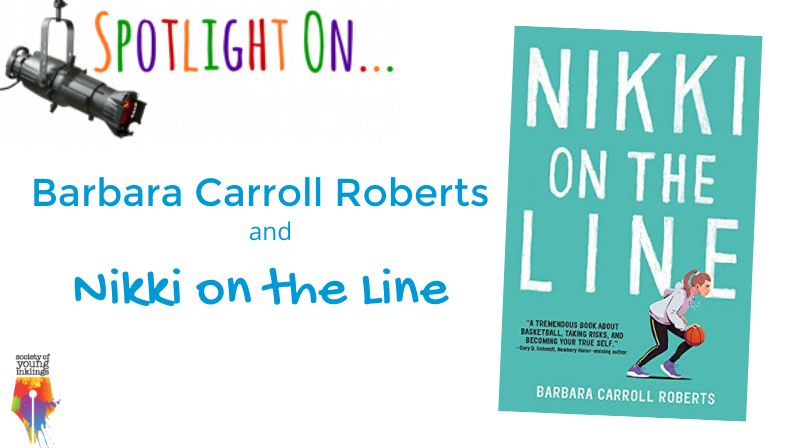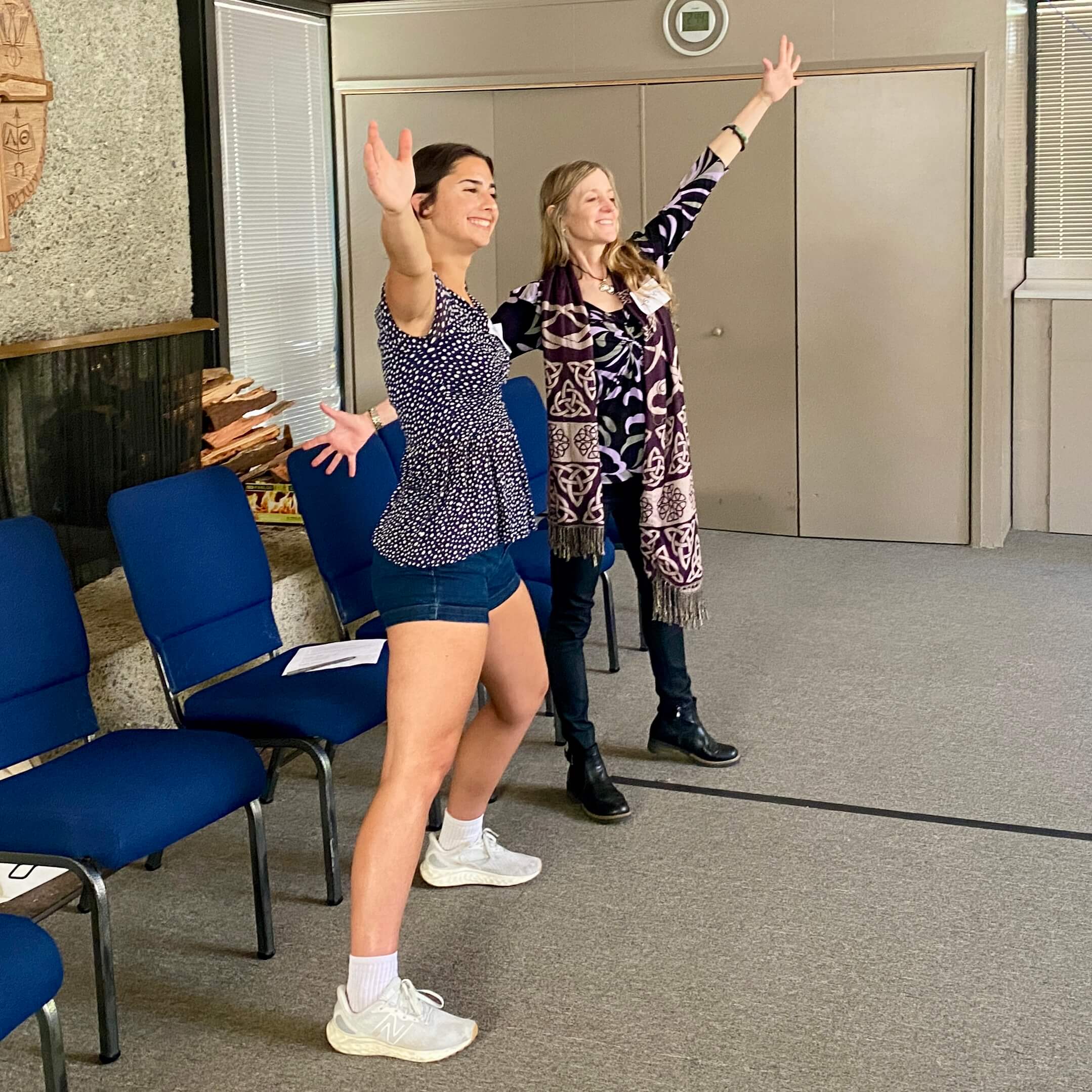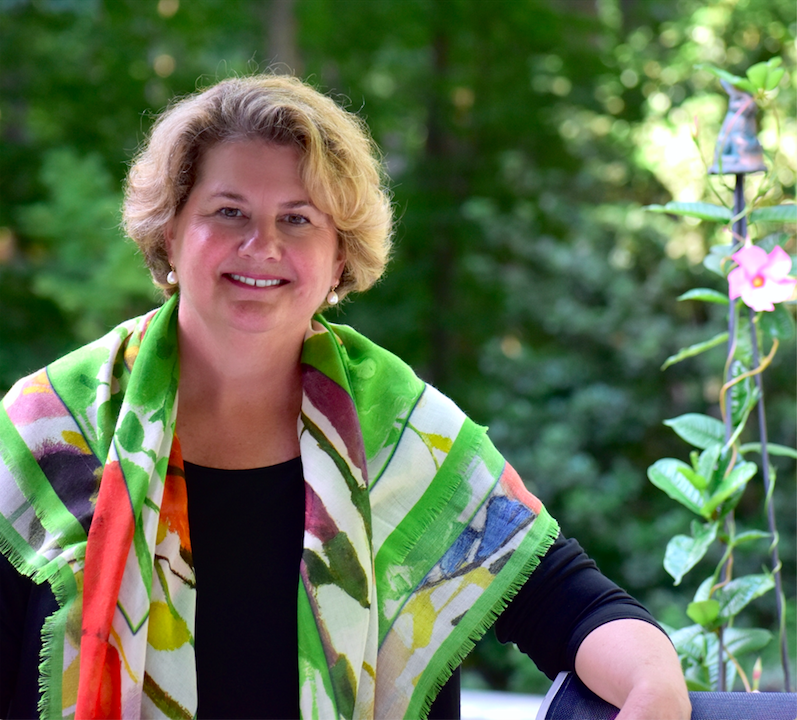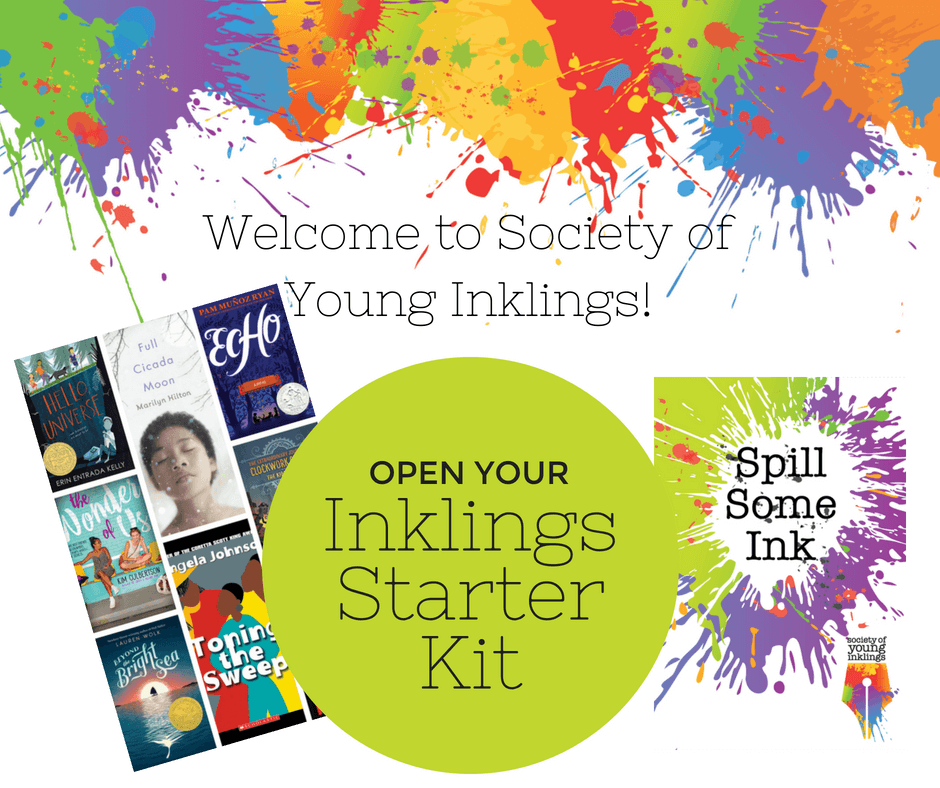For July’s Inksplat, we are thrilled to chat with Barbara Carroll Roberts, author of Nikki on the Line, who has some great advice to remember when we are feeling discouraged: “With every single thing you write, you’re learning something and gaining more skill and confidence. So no writing is ever wasted.”

Writing Challenge
This month’s writing challenge is a great one! A craft concept Barbara uses when writing (and especially re-writing) scenes or describing characters’ actions is called “Dominant Impression.” It means working to make sure all your descriptive language, images, actions work together to create a single, strong impression in the reader’s mind. For example, in her novel, here’s how she described the main character’s little brother getting off the school bus: “Sam exploded out the door. He flew up the street, his backpack slamming into his hips, his voice coming out in sharp bursts – ‘Nikki! Nikki! Guess what!’” You’ll probably agree, Sam is a high-energy, excitable kid.
So here’s your challenge: Either take the example of someone going up a street and use descriptive language (especially strong, distinctive verbs) to convey what that person is like (tired, scared, delighted, worried, sneaky, etc.); Or, find a passage of character action in your work and focus on your descriptive language, re-writing it to convey a strong Dominant Impression.

An Interview with Barbara Carroll Roberts
Did you write as a child?
I didn’t really like reading and writing when I was young. I liked running around outside and making lots of noise. And I didn’t really start liking reading until midway through high school when I had a really good teacher who introduced us to some great books. Also, when I was really young, there weren’t all of these wonderful middle grade and YA books that are out now. And so you basically went from reading little kid books, like “See spot run,” to Charles Dickens. There just wasn’t a lot of stuff that was written for young people about their concerns.
When did you realize that you wanted to be a writer?
When I went to college, I became an English major and I had to write lots and lots of papers. And, because it was a small school, I had some opportunities to write a play that was produced, and also some short stories. Unfortunately, it’s really hard to make a living writing short stories now and then. So I got a job as a technical writer in a big semiconductor company. And then I meandered into public relations and marketing. And that’s what I did for 15 years; I was a public relations and marketing writer. I wrote press releases and articles, I produced a video news program, I wrote brochures and annual reports. And it wasn’t always the most interesting stuff, like how to make a semiconductor. But what I realized later is that, number one, it taught me that if you plant your butt in your chair in front of your computer because it’s time to write, you will write. So that was a good lesson. But it also taught me that all writing is good practice, and, when I came back to writing fiction, people have told me that I’m good at writing action and at making things very clear so that it’s easy to read and to follow what I’m writing. I really do think that that came from writing all of that nonfiction, writing for a non-technical audience and trying to explain and make things as clear as possible. So that’s another piece of advice is that there definitely are ways to make a good living as a writer and that all writing is worthwhile. With every single thing you write, you’re learning something and gaining more skill and confidence. So no writing is ever wasted.
Let’s talk about your middle grade novel Nikki on the Line. How did you decide that this book was going to be the one you spent so much time and love and attention on?
I was actually working on a different project, a nonfiction biography, and I had gotten to a point where I was going to have to do some traveling to do research. And I had children at home, plus we didn’t have the money for me to pick up and go traveling. So my daughter plays basketball, and she became really, really serious about it. And I was spending all my time inside basketball gyms, and driving her around to basketball tournaments. And I realized, well, here’s my research. And at the same time, when she got to about seventh or eighth grade, she completely turned off to reading because there weren’t any books about really athletic girls. In the only ones that we found, the sport was kind of to the side, like the background. And the story was really about cliques or boys And I decided, okay, that’s what I’m going to write.
When I started, I was thinking I was writing it for my daughter and girls like her. But as I got more into it, I realized that I was also writing it for the girl I used to be. I played sports in high school, from 1970 to 1974. And in 1972, the Equal Opportunity and Education Act was passed. And part of that act was Title Nine, which basically said if a school or organization is getting funds from the federal government, they must provide equal opportunity for girls and women to participate in equal numbers to boys and men in athletics. And it opened up the world of sports for girls and women. When I was playing sports, in high school, we had one coach for our three basketball teams, and we only got to play in the gym if the boys weren’t using it. Otherwise, we’re outside on the blacktop. That was the world of sports that I grew up in, and I realized we need more books about girls who are really serious athletes. And that’s where I wanted the focus of the book to be.
What’s your favorite strategy for writer’s block?
A walk often shakes things loose. We’re fortunate to have a stream and a path going through our neighborhood, and so I often find that if I’m just really struggling with something, or I don’t know how to get from here to there, something will just shake loose while I’m walking. I start hearing dialogue in my head as I’m going. There is a scientific theory about moving large muscle groups. And the other thing that helps is taking a shower. Taking a walk, you’re looking around and you’re seeing all kinds of things. Taking a shower is kind of the opposite. It’s like you’re in sensory deprivation. And so your brain just starts playing.
Do you have any advice for writing characters very different from yourself?
For Nikki on the Line, I had to write ten distinct girls on the basketball team. And I could use my experiences with my daughter’s basketball team. It was a limited space of interaction in terms of how the girls interacted with each other, so I was focused on what united them as a team in that specific environment.
However, more generally, if you want to write about someone who is really, really different from you, then you have to go out and do really good research. You’ve got to read, you’ve got to meet people, you’ve got to ask for help. Be as honest with yourself as you can be, and, if you’re unsure, ask for help.

INKLINGS CONNECT
THE WAY WORDS MOVE US
Join us September 13 and 14 in Portola Valley, CA for our 2nd Annual Inklings Conference!
Featuring a keynote with author Joanna Ho, this conference includes creative writing breakout sessions in our beautiful redwood grove, workshops on using improv to step into a character’s shoes, experiments in word play, a storytelling workshop, and reflective writing to tap into your unique voice.
Keep your creativity flowing with our upcoming events!
JULY
- 7/22-25: Make Your Scenes Sparkle Summer Camp
- 7/22: Author Interview with JR Potter (Inklings Membership only)
AUGUST
- 8/6: Author Interview with John Hendrix (Inklings Membership only)
- 8/15: Teen Spilling Ink Writing Workshop (Inklings Membership only)
- 8/26: All Ages Spilling Ink Writing Workshop (Inklings Membership only)
SEPTEMBER
- 9/3: All Ages Spilling Ink Writing Workshop (Inklings Membership only)
- 9/8: 2024 Inklings Book Release Party (Online)
- 9/13-14: The Way Words Move Us Writing Conference in Portola Valley, CA
- 9/19: Teen Spilling Ink Writing Workshop (Inklings Membership only)
- 9/23: Author Interview with Roshani Chokshi (Inklings Membership only)

We appreciate Barbara Carroll Roberts for sharing with us! You can find out more about her work on her website, http://barbaracarrollroberts.com/
Barbara Carroll Roberts grew up in northern California. She holds a B.A. in English from Occidental College in Los Angeles and a Master of Fine Arts in Writing for Children and Young Adults from Hamline University in St. Paul, Minnesota. She’s held many jobs: farm worker, movie theater attendant, bookstore clerk, corporate communications writer, video producer, substitute elementary school teacher, children’s book reviewer, mom. And now, as a children’s writer, she has a job that allows her to draw on aspects of all her previous experience to create books for kids. She has two grown children and lives in northern Virginia with her husband, one ridiculously energetic Springer spaniel, and two cats. She is the author of the middle school novel, Nikki on the Line, and also has a nonfiction picture book and another picture book, A Rose Names Peace, coming out in 2021!
SPARK YOUR CREATIVITY!
Subscribe to our monthly Ink Splat for an exclusive author interview, a writing challenge, and other fun (and free!) goodies, curated especially for youth writers.
As a bonus gift, we’ll send you an Inklings Starter Kit packed with creativity-sparking fun.


